ZOMBIE FOR SALE (2019)
When a pharmaceutical company's illegal experiments inadvertently create a zombie, a strange family try to profit from it.
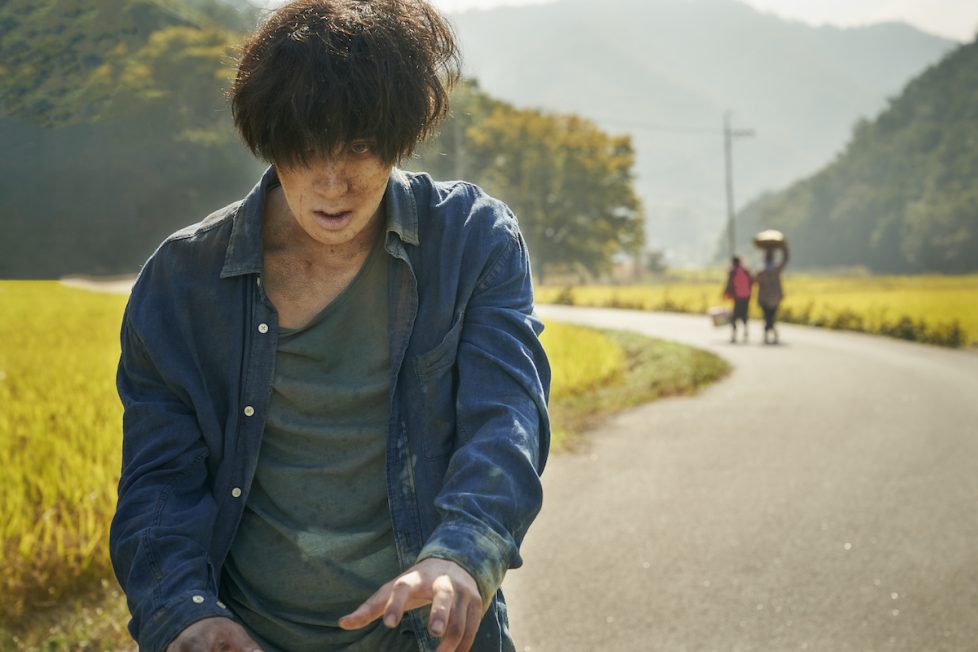
When a pharmaceutical company's illegal experiments inadvertently create a zombie, a strange family try to profit from it.


While South Korean zombie movies can be traced back to Beom-gu Kang’s cult feature A Monsterous Corpse (1981), the sub-genre didn’t become a phenomenon until Yeon Sang-ho made the high-octane Train to Busan (2016). Earning a staggering $98M from an $8.5M budget, that film inspired a resurgence of local interest in the zombie genre.
With the likes of One Cut of the Dead (2017) and Netflix’s Kingdom making the genre feel fresh again, first-time director Lee Min-jae arrives with an equally unique premise. Seamlessly weaving together comedy, horror, and heartfelt drama, Gimyohan gajok / The Odd Family: Zombie for Sale (the original title) relishes in playing against established rules of the zombie genre. Tackling the subject matter with a sense of humour, Min-jae crafts an entertaining “zom-com” that fans of Shaun of the Dead (2004) will certainly enjoy.
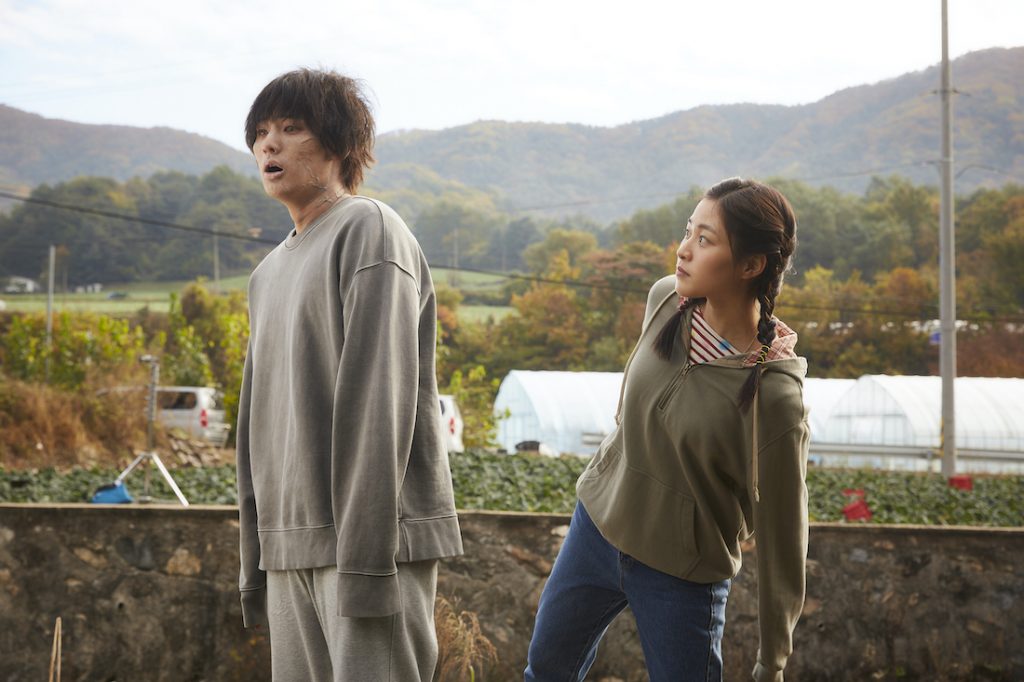
When a pharmaceutical company is exposed for carrying out illegal testing on humans, one of their test subjects escapes near the rural town of Poongsan and becomes a zombie (Jung Ga-ram) unhurriedly moving towards civilisation. Meanwhile, the pariah Park family are running a failing service station on the outskirts of the town, with Joon-Gul (Jeong Jae-yeong) and his wife Nam-Joo (Uhm Ji-won) providing for their family by scamming passers-by. After the approaching zombie bites Man-Deok (Park In-hwan), he becomes revitalised and full of life, so the family hatch a plan to exploit this unexpected fountain of youth and allow locals to pay to be bitten.
Each actor brings a unique charisma to their characters, creating authentic chemistry between the family members. Jeong Jae-yeong strays away from the hard-face demeanour he portrayed in Confession of Murder (2012) and Broken (2014), to play hen-pecked goofball Joon-gul, being entertainingly hapless when it comes to hustling others for money. Uhm Ji-won (Hope) plays his formidable wife Nam-joo who, although heavily pregnant, proves she’s handy with a frying pan—being almost as manic as the chain-smoking landlady from Kung Fu Hustle (2004). Kim Nam-gil (Memoir of a Murder) plays middle child Min-Gul, who’s returned home after being fired from a job in Seoul, while Lee Soo-Kyung (Rainbow Eyes) plays the socially awkward youngest daughter Hae-hul, who’s embarrassed by her family.
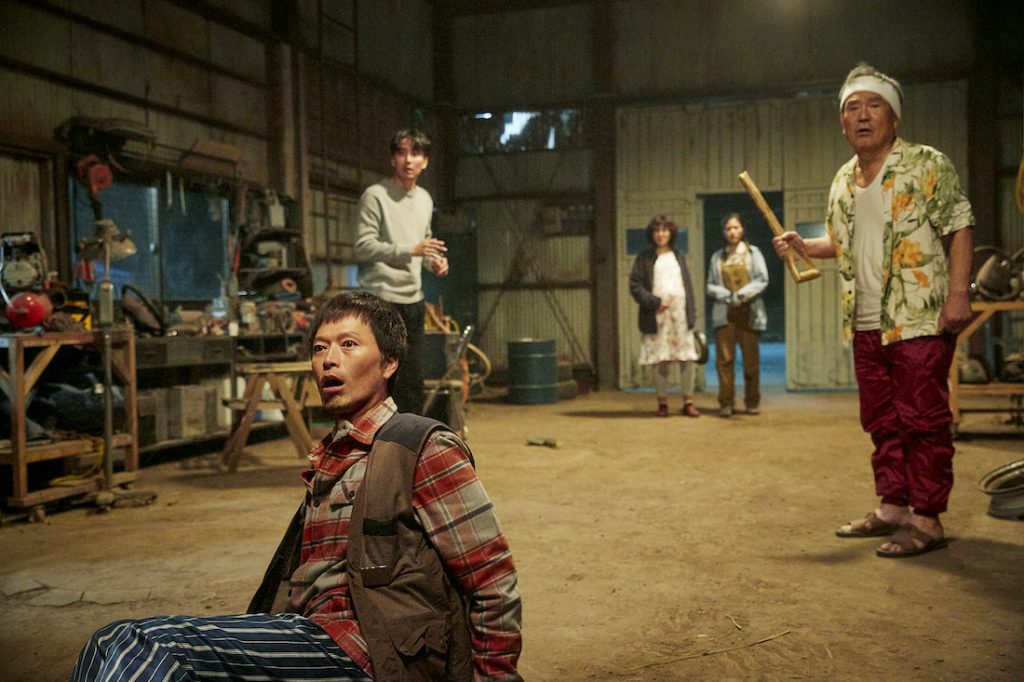
South Korean comedies are known for their quirkiness, and the Parks are a strange, amusing, and surprisingly close bunch. Their relationships are the source of much of the absurd hilarity. Living out in the “boonies” of Poongsan, Joon-gul and his wife survive by causing car accidents and charging the victims extortionate rates to fix the vehicles at their garage. Meanwhile, patriarch Man-deok is a degenerate gambler who cheats his own friends. Similar to Kim Jee-Woon’s The Quiet Family (1998), their dynamics are dysfunctional and flawed, yet such degenerates work perfectly in this strange setting. Their wisecracking and weird antics provide the majority of the laughs and add to the family’s overall charm.
Jung Ga-ram (The Poet and the Boy) plays Jjong-bi, the zombie at the heart of the story, a slow-witted monster kept just as happy with cabbages covered in ketchup as he is by human flesh. Similar to Jonathan Levine’s Warm Bodies (2013) or My Boyfriend’s Back (1993), Hae-gul is the only one who seems to see a young man still residing somewhere inside the zombie. Min-jae ensures this thread is sweet and innocent, which keeps it fresh and funny. The pair have several near-kisses, a quirky date, and make grand romantic gestures. One particular scene sees sweeping music swell as the pair tumble precariously into a cabbage patch. It feels strange to root for a romance where one of the participants is an ungainly zombie.
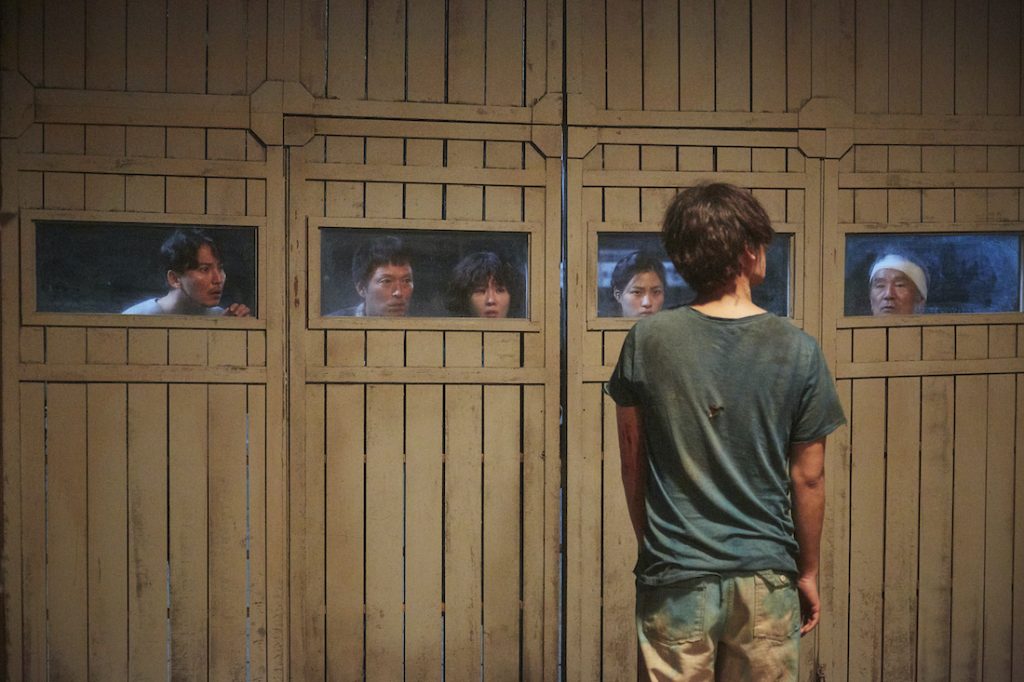
Co-written by director Min-jae and his wife Jeong Seo-in, Zombie for Sale has excellent comedic chops thanks to its witty script and playful energy. Each character is fully fleshed out without a note of falsehood to them, demonstrating the strength of the writing. It’s obvious how much thought and care the two have taken writing each scene. Admirably, the director steers clear of the traditional blood and gore, instead biding his time until the climax. What the director does so well is allow audiences to get to know the ways of the characters, and keeps using them to maintain some comedy through the tenser moments. A weaponised frying pan used by Nam-joo combines the slapstick comedy and zombie lore delightfully. Another great visual gag sees the ‘worldly’ Min-gul explaining the threat of a zombie by whipping out a Zombie Survival Guide book.
Once the Park’s discover anyone bitten by Jjong-bi becomes healthier and seemingly immortal, Zombie for Sale plays out similarly to Alejandro Brugués’ Juan of the Dead (2011) in how the family sees dollar signs in an undead creature tied up in their barn. After deciding to turn it into a business opportunity, they offer the elderly citizens of Poongsan new life in exchange for cash and a bite wound. Arguably, using one zombie as a source for a number of gags does become a little tiresome. Regardless, the pacing is so consistent that the 112-minute runtime never feels like it’s dragging. The blend of madcap energy and comedy coincides perfectly until events take a turn for the worse in the finale.
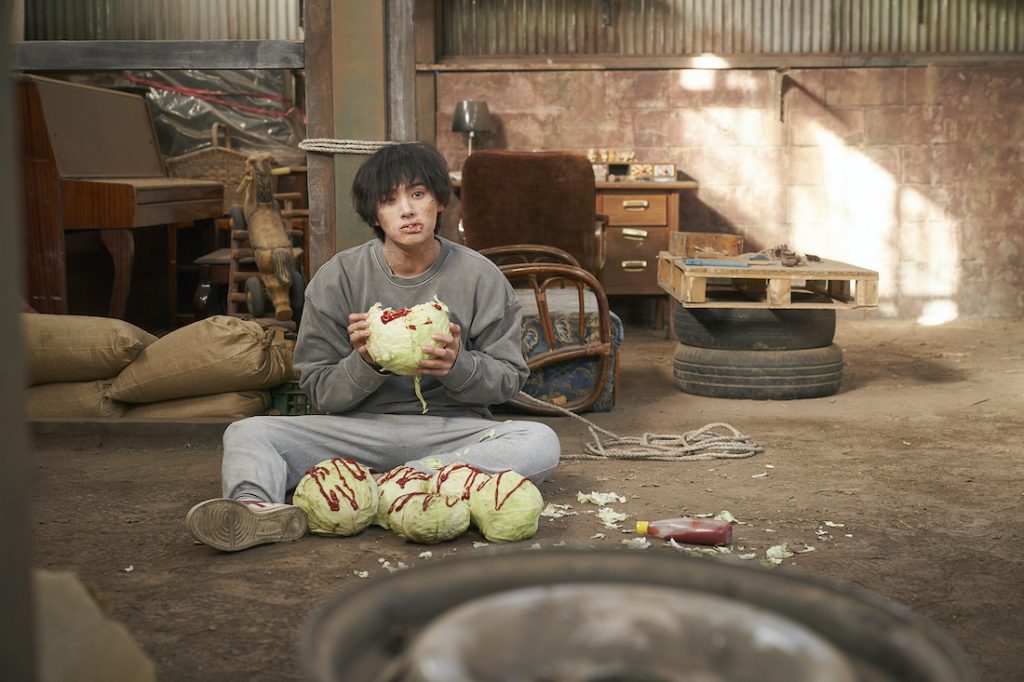
Min-jae runs with the social commentary, putting a novel spin on the genre. The quirky style of humour reverberating throughout Zombie for Sale is also present in several recent pieces of South Korean cinema, most notably Parasite (2019). Similar to Bong Joon-ho’s Academy Award winner, there’s an exhibition of entrepreneurial flair by the impoverished Park family. What is perhaps the most unique element of Zombie for Sale is the way it toys with the idea of the male obsession with virility. By opening the feature with a brief exposition explaining a pharmaceutical company has been conducting illegal experiments, Min-jae is highlighting the irony of pharmaceutical companies exploiting the vulnerable.
Although Zombie for Sale is primarily a comedy, it respects the conventions of the traditional zombie feature. Inevitably we find our way to the mass-infection, outbreak scenario, which has come to define the genre. The slapstick nature of the fight for survival during the finale evokes memories of Shaun of the Dead and Zombieland 2: Double Tap (2019), as we see the Park family gearing up for war wearing duvets and pots and pans to protect themselves from bites. Thanks to Min-jae’s excellent direction and stellar cinematography by Cho Hyoung-rae (The Merciless), the fight scenes soar with beautiful dramatic flair—most notably Man-deok’s wedding ceremony that plays out like a live-action version of Corpse Bride (2005). The gorgeous set pieces and vibrant splashes of colour compliment the crazy antics.
Ultimately, Zombie for Sale is a lighthearted and cheeky addition to the zombie genre. It walks a fine line between Shaun of the Dead and Warm Bodies. Lee Min-jae’s directorial debut isn’t groundbreaking but it stands apart from the regular zom-com. If you’re anticipating something with more horror elements, you could be disappointed, but with its array of comical characters and a new take on the genre, Zombie for Sale is a creative addition to the sub-genre everyone always thinks has been done to death.
SOUTH KOREA | 2019 | 112 MINUTES | 2.35:1 | COLOUR | KOREAN

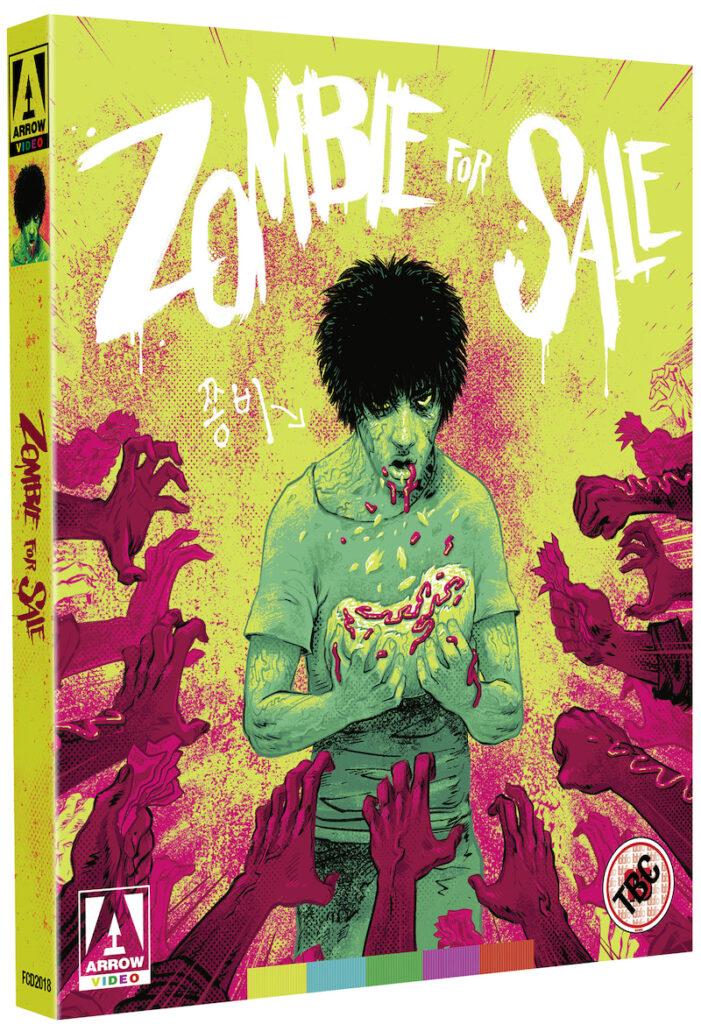

director: Lee Min-jae.
writers: Lee Min-jae & Jung Seo-in.
starring: Jung Jae-young, Kim Nam-gil, Uhm Ji-won, Lee Soo-kyung, Jung Ga-ram & Park In-hwan.
